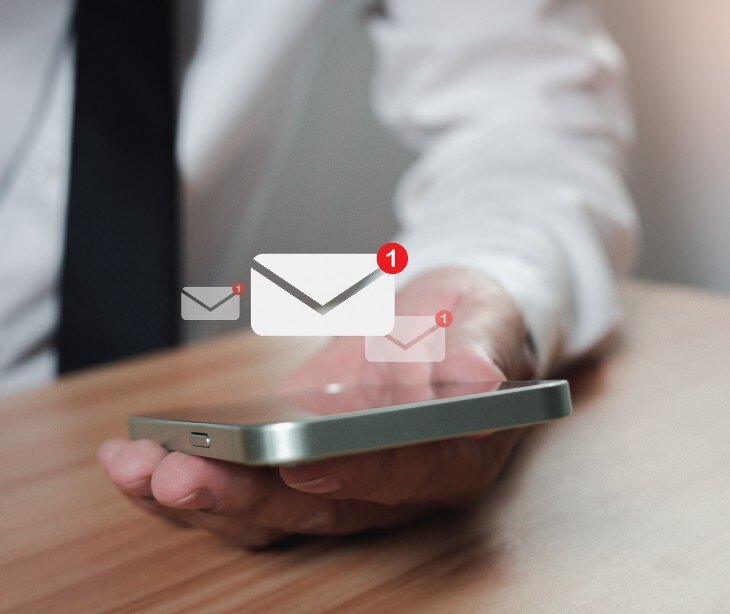4 min read
Improving quality of life for healthcare providers with HIPAA compliant email
Tshedimoso Makhene
June 26, 2024

The concept of quality of life (QoL) aims to assess the well-being of an individual or a population, considering all positive and negative aspects within the entirety of their existence at a specific point in time. A study that aimed to assess the quality of life among health workers (doctors and nurses) found that the “overall perception of quality of life was average, overall stress level of health-care workers was moderately elevated and majority showed average coping resources.”
HIPAA compliant email can impact the quality of life (QoL) of healthcare professionals in various significant ways. By ensuring secure, efficient, and reliable communication, it addresses many of the stressors and challenges that healthcare providers face daily.
The challenge of healthcare communication
Effective communication is the cornerstone of quality healthcare. Providers need to communicate with patients, coordinate with other healthcare professionals, and manage administrative tasks. Traditionally, much of this communication has been handled through phone calls, faxes, and face-to-face interactions, all of which can be time-consuming and prone to errors.
Furthermore, the sensitive nature of patient information requires robust security measures. The Health Insurance Portability and Accountability Act (HIPAA) mandates that any electronic communication containing protected health information (PHI) must be secure, posing additional challenges for healthcare providers.
The promise of HIPAA compliant email
HIPAA compliant email systems are designed to meet the stringent security requirements set forth by HIPAA, ensuring that patient information remains confidential and secure. These systems typically incorporate encryption, secure access controls, and robust auditing capabilities. By adopting HIPAA compliant email, healthcare providers can experience several benefits that directly enhance their quality of life.
Go deeper:
How HIPAA compliant email impacts the QoL of healthcare professionals
Enhanced communication efficiency
Streamlined communication
- Quick information exchange: Healthcare professionals can send and receive important information such as patient records, test results, and treatment plans quickly and securely. This reduces the time spent on phone calls, faxes, and in-person meetings.
- Efficient coordination: Email allows for seamless coordination among different healthcare providers and departments, ensuring that all team members are informed and up-to-date on patient care plans.
Reduced administrative burden
- Automated reminders: Automated email reminders for appointments, follow-ups, and prescription refills reduce the administrative workload, allowing providers to focus more on patient care.
- Organized records: Emails provide an organized, easily searchable record of communications, reducing the time and effort required to manage and retrieve patient information.
Improved patient-provider relationships
Better patient engagement
- Accessibility: Patients often find email more accessible and convenient for communication than phone calls or in-person visits. This can lead to increased patient engagement and better adherence to treatment plans.
- Continuous support: Providers can offer continuous support and advice through email, which helps in maintaining a strong patient-provider relationship and improves patient satisfaction.
Personalized care
- Detailed communication: Email allows providers to send detailed instructions and personalized advice, which patients can refer to as needed. This ensures that patients fully understand their care plans and follow them correctly.
- Timely follow-up: Providers can easily follow up with patients via email, ensuring that any post-treatment concerns are addressed promptly, which enhances patient care quality.
Learn more: Defining personalized care
Reduced stress and burnout
Administrative relief
- Less paperwork: The transition to digital communication significantly reduces paperwork, which is a major source of stress for healthcare providers. This leads to a more manageable workload and less administrative hassle.
- Efficiency gains: Efficient communication reduces the time spent on routine administrative tasks, allowing providers to dedicate more time to direct patient care and other critical activities.
Work-life balance
- Flexible communication: Providers can manage emails at their convenience, allowing for a more flexible schedule. This flexibility can help in balancing professional responsibilities with personal life, contributing to better work-life balance.
- Remote work capability: In some cases, providers can handle certain tasks remotely through secure email, reducing the need for constant physical presence at the healthcare facility and offering more personal time.
Enhanced data security and compliance
Regulatory compliance
- HIPAA compliance: Using a HIPAA compliant email system ensures that providers adhere to legal requirements for data security, reducing the risk of penalties and legal issues.
- Audit trails: These systems often include audit trails, providing a clear record of who accessed and sent information, which is crucial for compliance and accountability.
Patient trust
- Confidence in security: Knowing that their data is secure, patients are more likely to trust their healthcare providers. This trust enhances the provider-patient relationship and leads to higher patient satisfaction.
- Reduced risk of breaches: Secure email systems significantly reduce the risk of data breaches, which can be highly stressful and damaging to both providers and healthcare organizations.
Implementation Considerations
- Vendor selection: Selecting a vendor that offers robust security features, ease of use, and reliable customer support is crucial. Providers should ensure that the system meets all HIPAA requirements.
- Integration: The email system should integrate seamlessly with existing electronic health record (EHR) systems and other healthcare IT infrastructure.
- Staff training: Proper training ensures that all staff members can effectively use the new email system. This includes understanding security protocols and best practices for communication.
- Patient education: Educating patients on the benefits and use of secure email communication can enhance adoption and engagement.
- Continuous improvement: Regular updates and maintenance ensure that the email system remains secure and functional. Providers should work with their vendors to implement improvements and address any issues promptly.
- Feedback mechanism: Establishing a feedback mechanism can help providers and administrators identify areas for improvement and ensure that the system meets the needs of all users.
FAQs
What is HIPAA compliant email?
HIPAA compliant email refers to email systems that adhere to the regulations set forth by HIPAA. These systems ensure that all electronic communications containing PHI are secure and confidential, typically through encryption, secure access controls, and audit trails.
Why is HIPAA compliance important for email communication in healthcare?
HIPAA compliance is crucial for protecting patient privacy and ensuring the security of sensitive health information. Non-compliance can result in significant penalties and legal issues for healthcare providers. Using HIPAA compliant email helps healthcare organizations avoid these risks and maintain the trust of their patients.
See also: What are the consequences of not complying with HIPAA?
What characteristics must an email service have to be considered HIPAA compliant?
To be considered HIPAA compliant, an email service must have the following characteristics:
- Encryption: Ensures emails are encrypted during transmission and at rest.
- Access Controls: Implements strict access controls to limit who can read, write, or transmit emails.
- Audit controls: Provides audit logs to track access and activity related to PHI.
- Integrity controls: Ensures that PHI is not improperly altered or destroyed.
- User authentication: Requires strong user authentication to access email accounts.
- Transmission security: Protects against unauthorized access to PHI during transmission.
Additionally, the email service provider should sign a business associate agreement (BAA) with the healthcare entity.
Subscribe to Paubox Weekly
Every Friday we'll bring you the most important news from Paubox. Our aim is to make you smarter, faster.



